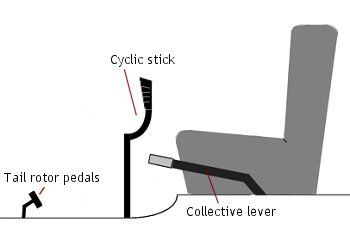Flying Helicopters – ArmA: Armed Assault
Introduction
Since the flight model of helicopters in ArmA is a bit more demanding than it used to be in OFP, here are some tips for beginners and experts on how to control them efficiently.
Flight Controls
There are 3 controls in a chopper :
- Cyclic
- Collective
- Rudder
Cyclic controls the attitude of your chopper, it is the stick in the middle of the cockpit, between the legs. It banks the airframe left and right, and pulls nose up or down.
Collective control the global sustentation of the blade, so basically, when it is pulled, the chopper gains altitude, when it is pushed, the chopper loses altitude.
Rudder controls the power applied to the tail rotor or the differential of power applied to both main rotors in contra-rotative helicopters (like the Ka-50). It makes the chopper frame change direction without banking or changing attitude.
Typically, the controls in a chopper are found like shown in the picture above :
Flight Model
Flight controls have secondary and in some cases, tertiary effects. Only a few of them are modelled in ArmA:
- by pulling the nose up at significant speeds causes the helicopter to gain altitude
- the opposite is true, when you push the nose down to gain speed, you lose altitude
- the rudder loses authority when speed increases due to the forward velocity "pushing you straight", up to a point where it has nearly no effect
- by pulling power in from the ground, the aircraft will want to turn the opposite way to the blades turning, this is an effect of torque. Counter it by using the tail rotor (anti-torque rotor).
Gunner controls
The machine guns (M124?) can be aimed using the mouse. You can even target outside of the cockpit visible range by using the gun's CCTV (press right mouse button to activate).
FFAR rockets are best for taking out tanks, but they seem to be non-aimable, so as gunner you need to wait for the pilot to bring your crosshairs in line with the target.
Hellfire rockets - I'm not sure. I think they are Air-to-Air rockets.
How-Tos
(how to turn, land, etc. What and how to practice)
Landing tips
Ensure the area under your chopper is clear of trees, building or other obstacles. Since it is difficult to look directly down, you will want to pick a suitable landing area before your final descent.
Dropping troops off in a combat zone
Avoid flying directly over the area of engagement if possible to prevent yourself from becoming a target.
